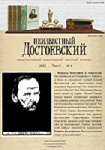Биографии русских писателей как мишень пост-правды
Biographies of Russian Writers as a Target of Post-Truth
Author(s): Liudmila Ivanovna SaraskinaSubject(s): Cultural history, Russian Literature, Ancient Philosphy, Film / Cinema / Cinematography
Published by: Петрозаводский государственный университет
Keywords: F. M. Dostoevsky; post-truth; A. S. Pushkin; Plato; Plato’s treatise The State; B. Akunin; The Turkish Gambit; J. M. Coetzee; The Master of Petersburg; artistic interpretation;
Summary/Abstract: The article examines the influence of the phenomenon of post-truth on the creation of artistic images of Russian writers in the novel and screen arts. The essence, tools and role of post-truth in the construction of political and cultural life were described by Plato in the “The State.” Having spread in modern times, post-truth seeks to replace the truth of history, to infiltrate real destinies and biographies, to act in their place, to operate with imaginary things instead of authenticity, to use the “bad is more interesting than good” principle. The experience of the first Russian silent film biography of A. S. Pushkin (1910) and all the subsequent eighteen biographical films about the poet’s fate showed the flaws of artistic adaptations dedicated to real heroes: historical unreliability, untruth of character, deliberate distortion of biography, the introduction of false, politically biased versions for the sake of greater showiness and scandalousness. The central plot of the article is devoted to artistic texts related to the image of F. M. Dostoevsky. Boris Akunin’s novel “The Turkish Gambit” (1998) touches on the events of the Russian-Turkish War of 1877–1878, describing them from openly Ottomanophile positions, painting the characters fighting for Russian interests in dark colors. The novel author focuses on author of the “Writer’s Diary;” depicted namelessly, but with a full set of biographical signs, he is vindictively and scandalously defamed. Dostoevsky is present in J. M. Coetzee’s novel “The Master of Petersburg” (1994, translated from English 1999), also in the “shame and fall” perspective. The image of the real Dostoevsky is deliberately distorted, rather than elevated, in the created neo-myth — the debunking of the Russian writer was apparently the true goal of the novelist
Journal: Неизвестный Достоевский
- Issue Year: 9/2022
- Issue No: 4
- Page Range: 44-68
- Page Count: 25
- Language: Russian

